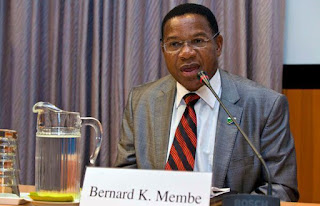Monday, December 10, 2012
Tanzanians told to emulate Angola’s experience of gas extraction
AS Tanzania prepares to work on various strategic plans on how to manage the extraction of its discovered natural gas deposits in southern region of Mtwara, the Minister for Foreign Affairs and International Cooperation Benard Membe has urged the government to adopt the technology being applied in Angola, a giant economic producer of natural gas in Africa. Minister Membe made the call recently in Dar es Salaam when addressing members of various diplomatic corps accredited in the country who attended the 37th anniversary celebrations of Angola’s independence, the occasion was organized by the Embassy of Angola in the country. In his speech, Membe praised Angola for its economic advancements it has made so far since independence time and said that, it’s a country worth to be emulated by Tanzania government when it comes to gas extraction. However, he said adding that, Angola’s economic success is as a result of the cooperation amongst its citizens since the country liberated itself from the Portuguese colonial yoke way back in 1975, and that it had shown a tremendous development initiatives in its economy citing minerals and natural gas as the major economic drive which have made it to become a giant economic producer in Africa. “Angola is one of the world’s major centres for oil and gas exploration and the nation's wealth of hydrocarbon resources attracts investment in both the industry and the community”, he said adding that, apart from natural gas, and it ranks the third largest oil producer in Africa after Libya and Nigeria.
In January 2007, Angola became the 12th member of the Organization of Petroleum Exporting Countries (OPEC) and a significant supplier of its rich underground natural resources to both China and the United States. Describing its other economic features such as the infrastructure built across the country, Membe noted that, Angola has its road flyovers, and currently its government is underway to introduce a bullet train journey that would cut across southern African countries from Lubeto to Luanda and Zambia and if possible would enter in Tanzania. Other developments included housing for its people and that currently the country maintains its stance to transform the lives of its rural people at all costs in order to develop social and economic life. In view of this, he said adding that Tanzania must adopt its way of economy. Although not well known, the natural gas reserves in Angola are estimated above the 11 TCF (trillions of cubic feet), being its majority associated gas. The lack of more accurate knowledge of natural gas reserves in Angola in part is due to the absence of dedicated investment and non existence of a legal and contractual framework. Meanwhile, the Ministry of Foreign Affairs is planning to advise the government to send the current Minister for Energy and Minerals Professor Sospeter Muhongo to visit the country to acquire experience and skills of the technology used for gas extraction and exchange ideas with Angolan experts. On his part, the Angolan Ambassador accredited in the country Professor Ambrosio Lukoki noted that, Tanzania might be able to receive oil from Angola and advantageous conditions and benefit from Angola’s experience in the oil and gas industries. He said Tanzania might benefit economically from the bilateral relations which has been existing between these two countries for the last 37 years now, and added that, this is a consolidation of the excellent political-diplomatic relations between the two countries which dates back from the beginning of the struggle for national liberation. Describing social and educational development of his country, the Ambassador noted that, in order for his country to meet the demand of youths in his country, his government has established 17 national universities and has other 44 higher learning institutions for technical professional education. All these he said have been invested with an equivalent of more than $480 million for the last three years.
Subscribe to:
Post Comments (Atom)












No comments:
Post a Comment